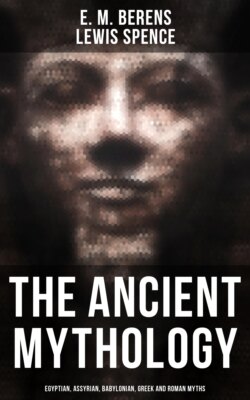Читать книгу The Ancient Mythology: Egyptian, Assyrian, Babylonian, Greek and Roman Myths - Lewis Spence - Страница 43
На сайте Литреса книга снята с продажи.
The Beginnings of Babylonian Religion
ОглавлениеThe true beginning of a religion is that epoch in its history when it succeeds, by reason of local or national circumstances and environment and by racial genius, in raising itself from those purely animistic influences which are characteristic of early faith and from which all great religions have emerged, if they have not been able entirely to free themselves from associations which by reason of their antiquity and the hold they achieve on the mind of humanity are particularly difficult to cast off. Thus a sense of nationality and the attainment of a high standard of righteousness assisted in shaping Jewish religion. The necessity for military efficiency and therefore of sacrifice to the gods was moulding a real if terrible religion in ancient Mexico when the invading Spaniards ended the hideous masque of tragedy. Insight and meditation lent an air of ethical exaltation to the Vedic religion of India. Thus in a manner peculiarly its own, and according to the trend of its particular genius, did each race evolve a suitable religion from an original animistic basis.
If we are to discover the foundations of any system or cult, however, if we are to excavate the soil religious as we would the soil archæological in the hope of coming upon the basis of any particular faith, we must undertake the work in a manner as thorough as that of the antiquary who, pick in hand, delves his way to the lowest foundations of palace or temple. The earliest Babylonian religious ideas—that is, subsequent to the entrance of that people into the country watered by the Tigris and Euphrates—were undoubtedly coloured by those of the non-Semitic Sumerians whom they found in the country. They adopted the alphabet of that race, and this affords strong presumptive evidence that the immigrant Semites, as an unlettered people, would naturally accept much if not all of the religion of the more cultured folk whom they found in possession of the soil.
There is no necessity in this place to outline the nature of animistic belief at any length. This has been done in so many other volumes of this series and in such detail that it is sufficient to state here succinctly that animism is a condition of thought or belief in which man considers everything in the universe along with himself to be the possessor of 'soul,' 'spirit,' or at least volition. Thus, the wind, water, animals, the heavenly bodies, all live, move, and have their being, and because of his fear of or admiration for them, man placates or adores them until at length he almost unconsciously exalts them into a condition of godhead. Have we any reason to think that the ancient Semites of Babylonia regarded the universe as peopled by gods or godlings of such a type? The proofs that they did so are not a few.
